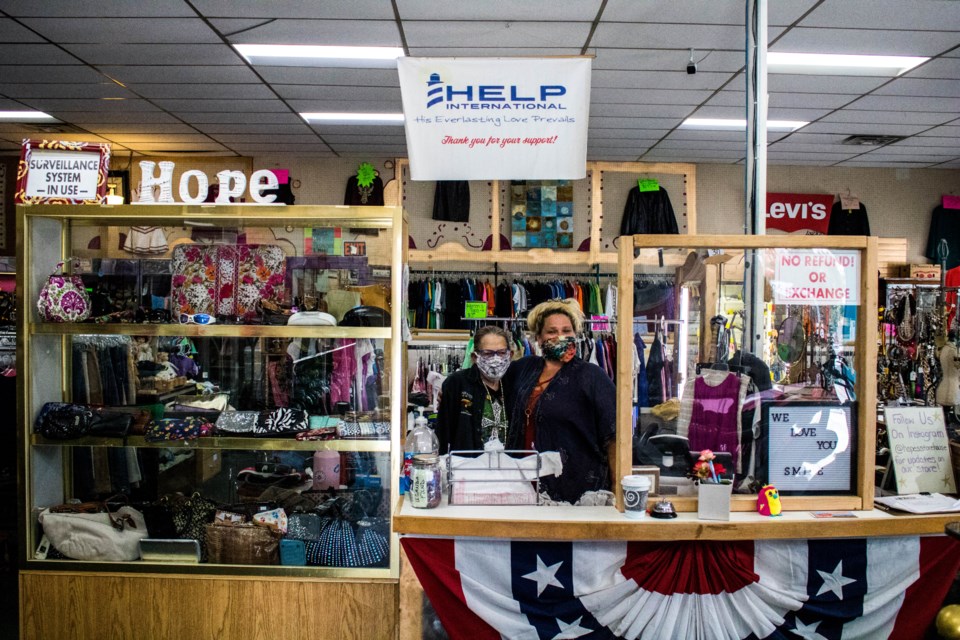Today is National Thrift Shop Day, a celebration of resale stores across the United States.
Longmont is home to nearly a dozen thrift and consignment stores, from locally owned shops like Hidden Treasure and Hope’s Storehouse, to larger nonprofits like Goodwill and ARC. Aside from providing a place for consumers to donate their old or unwanted items and find bargains, the organizations that operate many thrift stores use the proceeds to aid in numerous charitable causes.
Retail locations across the state closed in March as the coronavirus pandemic took hold, but many thrift stores worked to reopen as quickly as possible when they were allowed to do so. An employee at the Longmont Goodwill Thrift Store reported seeing around 62 customers per hour during its reopening weekend in early May. Approximately 1,600 cars per weekend visit the Longmont location to drop off donations.
Sales of donations help fund Goodwill career development programs.
Smaller operations like Hope’s Storehouse have kept things functioning as close to normal as they can. In the same location for 15 years, the charming and surprisingly large retail space has mannequins wearing masks, signs informing customers of the policies and tightened restrictions. Bathrooms and dressing rooms are closed to the public and all surfaces and handles are cleaned and sterilized as often as possible. Donations are thoroughly cleaned before being added to the retail floor.
Dee Carlson, who has been employed with the Hope’s Storehouse since the beginning, is staying positive.
“We stayed open during the floods, and we’ve been through recessions. I’m feeling hopeful, even on the slow days,” she said.
Sales at Hope’s Storehouse support H.E.L.P. International efforts to fund schools and clinics in Uganda.
The Habitat for Humanity of the St. Vrain Valley ReStore also funds the nonprofit’s mission to build affordable homes for local families. Its safety precautions include mask wearing and frequent sanitizing. In addition, staff is accepting a smaller number of donations. The lower volume allows for time to thoroughly sanitize each item and then store it for a week prior to it being placed on the sales floor.
By utilizing the size of the space, as well as multiple entryways, craft consignment store Hidden Treasure 2 has kept a through path with one entry and one exit to make social distancing easier to enforce. In addition to a designated entrance and exit and increased sanitizing procedures, the store is limiting the number of customers inside at one time and consignment is predominantly done by appointment only.
Jeff Noonan, whose wife owns Hidden Treasure 2, was enthusiastic about the store’s ability to support the community. News coverage from outlets locally all the way to Denver have highlighted the efforts at Hidden Treasures to produce masks for schools, assisted living facilities and more. The store has reached a point where it is running out of materials, particularly fabrics that are ideal for producing facial coverings. Noonan has established a GoFundMe for Hidden Treasure, as the costs of its efforts have started to weigh on the store.
Though there are some risks in buying used items, the consensus from management and staff at the resale stores in Longmont was to follow Centers for Disease Control guidelines when taking items home. Those include thoroughly cleaning and disinfecting hard surfaces and washing clothing and other soft goods.
Consignment and resale stores must follow the same Safer at Home COVID-19 prevention guidance as other retail outlets, Chana Goussetis, spokesperson for Boulder County Public Health, said in an email.
“Shopping at a thrift store is a great way to support sustainability and save money. By reusing and upcycling instead of buying new, we can save vital resources and often find more original and unique items, too,” Goussetis said. “As with any in-person shopping, individuals should always wear a face covering, keep at least 6 feet from others at all times, and avoid touching their face. If possible, visit stores when they are less busy, to avoid close contact with others.”
When people get their purchases home, she said “it’s also always a good practice to wash anything you purchase before using or wearing it. Normal routine cleaning with soap and water removes germs and dirt from surfaces and lowers the risk of spreading COVID-19 infection. Disinfectants can kill germs on surfaces after cleaning.”
There are more than 25,000 resale, consignment and nonprofit resale shops in the United States, according to NARTS, the Association for Resale Professionals. In a post to its website, the association cites America’s Research Group studies that indicate 16% to 18% of Americans will shop at a thrift store during a given year and that 12% to 15% will shop consignment/resale shops. The same research indicates that in the same time frame 11.4% of Americans shop in factory outlet malls, 19.6% in apparel stores and 21.3% in major department stores.


